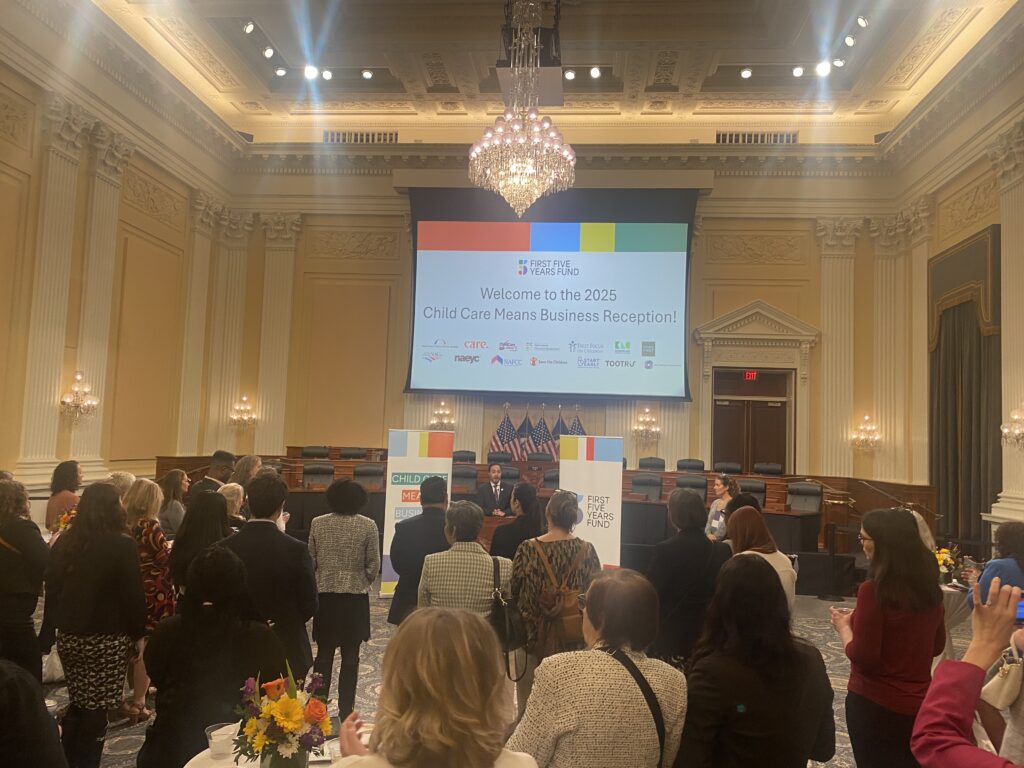Bipartisan Agreement on the Importance of Child Care Access and Affordability in Senate Finance Hearing

The Senate Finance Committee held a hearing this week to discuss ways to leverage Congressional investments in early learning and child care to better support working families and child care providers.
The hearing, entitled “Examining the State of Child Care: How Federal Policy Solutions Can Support Families, Close Existing Gaps, and Strengthen Economic Growth,” featured child care experts, researchers, and state administrators who all spoke to the critical role of affordable, reliable, high-quality child care in ensuring parents and caretakers are able to enter and remain in the labor force and providers are able to provide quality care that meets the needs of families. Senators on both sides of the aisle demonstrated broad agreement that access to quality, affordable child care remains critical for families and the economy and discussed the need for addressing challenges in the child care sector through federal investments, including tax enhancements to support families. This discussion comes ahead of a broader discussion in 2025 where the Senate Finance Committee will play a key role in drafting a larger tax package, providing a key opportunity to better support working families in accessing and affording child care.Witnesses included:
- Megan Pratt, Ph.D., Assistant Professor Of Practice, College Of Health, Oregon State University
- Fatima Goss Graves, President & CEO, National Women’s Law Center
- Katharine B. Stevens, Ph.D., Founder & President, Center on Child and Family Policy
- Ryan Page, Director of Child Care, Iowa Department of Health and Human Services
In his opening statement, Chairman Ron Wyden (D-OR) highlighted the importance of the Committee’s jurisdiction over Child Care Entitlement to States (CCES) funding, which is combined with Child Care and Development Block Grant (CCDBG) funding to establish the Child Care & Development Fund (CCDF). Senator Wyden also emphasized the importance of supporting the child care workforce, noting that “the child care workforce has seen unprecedented turnover in the last few years, and it’s clear we need to find a way to recruit new providers, and help them stay in these roles.”
In his opening remarks, Ranking Member Mike Crapo (R-ID) underscored the importance of child care for families, noting that “many Americans rely on some form of child care, which not only allows parents to remain in the workforce, but also provides children with critical social and educational development opportunities. Unfortunately, for some families, child care is either unaffordable or unavailable.” He also echoed Chairman Wyden’s remarks and discussed the importance of the committee’s jurisdiction over CCES funding, noting that the program “allow[s] families to choose the child care arrangement that best suits their needs.”
During the Q&A portion of the hearing, Senators continued to underscore the importance of ensuring that child care supply remains stable and accessible for families. Chairman Wyden asked about improving the stability of the child care workforce in order to ensure that working parents can access care and thus grow the economy. Dr. Pratt agreed that workforce challenges remain a priority, and that keeping programs staffed is a challenge for providers in Oregon. Ms. Graves underscored that there is a significant loss of revenue in the U.S. economy due to persistent child care access and affordability gaps, and that child care is essential infrastructure for the economy to function.
Ranking Member Crapo highlighted the flexibility that CCDF provides states to be able to create child care systems that meet the unique needs of their state, in addition to maximizing parental choice as “parents should be empowered to make decisions for their children.” Ms. Page echoed these sentiments, noting that Iowa has been able to use these funds to engage in data-driven decisionmaking and target resources efficiently. She also noted that 17% of Iowa providers are faith-based providers, emphasizing that families need a variety of provider types to suit varying needs.
Sen. Bob Casey (D-PA) shared that he continues to hear from families across Pennsylvania about challenges in affording child care, and highlighted his own Child and Dependent Care Tax Credit Enhancement Act, which would expand the tax credit to help offset the cost of child care for families. Senator Casey emphasized that the Finance Committee has “a big opportunity in 2025 to use the tax code to help families on a host of fronts.”
Sen. Chuck Grassley (R-IA) reiterated that “finding solutions to improve affordability of childcare is very much an overall workforce issue.” He asked about examples of successful public-private partnerships in Iowa that other communities could emulate. Ms. Page shared that the state has numerous cost-sharing agreements with local businesses to offset the cost of child care for employees. Senator Grassley also asked about the unique challenges that rural communities face in accessing child care. Ms. Page noted that Iowa is working to gather data on the number of available slots, operational capacity, and types of providers in rural communities.
Sen. Catherine Cortez-Masto (D-NV) echoed her colleagues in supporting parental choice in child care, noting that in Nevada “there are not enough choices.” She also noted that “child care providers in [her] state are struggling to pay staff living wages, which has an impact on keeping those doors open.” Ms. Graves agreed, sharing that child care providers are struggling to recruit and retain a workforce, which impacts sector stability.
Sen. John Barrasso (R-WY) emphasized the high cost of child care, noting that “child care costs continue to rise… parents are struggling to make ends meet. In almost every state child care is surpassing the average rent and mortgage payments. In Wyoming, the average household spends 10 to 14% of their income on child care.” Ms. Page noted that in Iowa they are working to tackle this issue by examining reimbursement rates and to understand the true cost of care. Sen. Barrasso also noted that with the prevalence of child care deserts, parents are forced to make decisions about whether or not to participate in the workforce.
As Congress seeks to better support working families with the high cost of care, the Finance Committee will have a unique opportunity to leverage and expand existing tax credits aimed at supporting working parents in accessing and affording child care during broader tax negotiations in 2025 with the expiration of the Tax Cuts and Jobs Act (TCJA) of 2017. We urge members in both the House and the Senate to examine how an expansion of credits such as the CDCTC, the Employer Provided Child Care Credit (known as 45F), and the Dependent Care Assistance Plan (DCAP) can have a significant impact on working families across the U.S. and their ability to access and afford care.
Video of the hearing can be found here.
Subscribe to FFYF First Look
Every morning, FFYF reports on the latest child care & early learning news from across the country. Subscribe and take 5 minutes to know what's happening in early childhood education.



